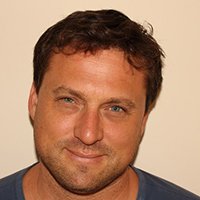
- This event has passed.
“Biological and Bionic hands: Natural Neural Coding and Artificial Perception”
October 28, 2016 @ 12:00 pm - 1:00 pm

Coulter Seminar Series Presents: Rehabilitation Engineering
“Biological and Bionic hands: Natural Neural Coding and Artificial Perception”

Sliman Bensmaia, PhD
Associate Professor
Department of Biology and Anatomy
University of Chicago
Dr. Sliman Bensmaia received a B.A. in Cognitive Science from the University of Virginia in 1995, and a Ph.D. in Cognitive Psychology from the University of North Carolina at Chapel Hill, in 2003, under the tutelage of Dr. Mark Hollins. He then joined the laboratory of Dr. Kenneth Johnson, at the Johns Hopkins University Krieger Mind/Brain Institute, as a postdoctoral fellow. In 2009, Dr. Bensmaia joined the faculty in the Department of Organismal Biology and Anatomy at the University of Chicago, where he is also a member of the Committees on Neurobiology and on Computational Neuroscience. Bensmaia is a leading expert on the neural basis of somatosensation in human and non-human primates, which his laboratory investigates by combining psychophysics, Neurophysiology, and computational modeling Bensmaia also seeks to apply insights from basic science to develop approaches to convey sensory feedback in upper-limb neuroprostheses.
ABSTRACT
Our ability to manipulate objects dexterously relies fundamentally on sensory signals originating from the hand. To restore motorfunction with upper-limb neuroprostheses requires that somatosensory feedback be provided to the tetraplegic patient or amputee. Given the complexity of state-of-the-art prosthetic limbs, and thus the huge state-space they can traverse, it is desirable to minimize the need of the patient to learn associations between events impinging upon the limb and arbitrary sensations. With this in mind, we seek to develop approaches to intuitively convey sensory information that is critical for object manipulation – information about contact location, pressure, and timing – through intracortical microstimulation (ICMS) of primary somatosensory cortex (S1). To this end, we first explore how this information is naturally encoded in the cortex of (intact) nonhuman primates (Rhesus macaques). In stimulation experiments, we then show that we can elicit percepts that are projected to a specific localized patch of skin by stimulating neurons with corresponding receptive fields. Similarly, information about contact pressure is conveyed by invoking the natural neural code for pressure, which entails not only increasing the activation of local neurons but also recruiting adjacent neurons to signal an increase in pressure. In a real-time application, we demonstrate that animals can perform a pressure discrimination task equally well whether mechanical stimuli are delivered to their native fingers or to a prosthetic one. Finally, we propose that the timing of contact events can be signaled through phasic ICMS at the onset and offset of object contact that mimics the ubiquitous on and off responses observed in S1 to complement slowly-varying pressure-related feedback. We anticipate that the proposed biomimetic feedback will considerably increase the dexterity and embodiment of upper-limb neuroprostheses and will constitute an important step in restoring touch to individuals who have lost it.
Refreshments Provided
Presented From: 4142 Engineering Building III (NC State)
Video Conferenced to: 321 MacNider (UNC) & East Carolina University (ECU)